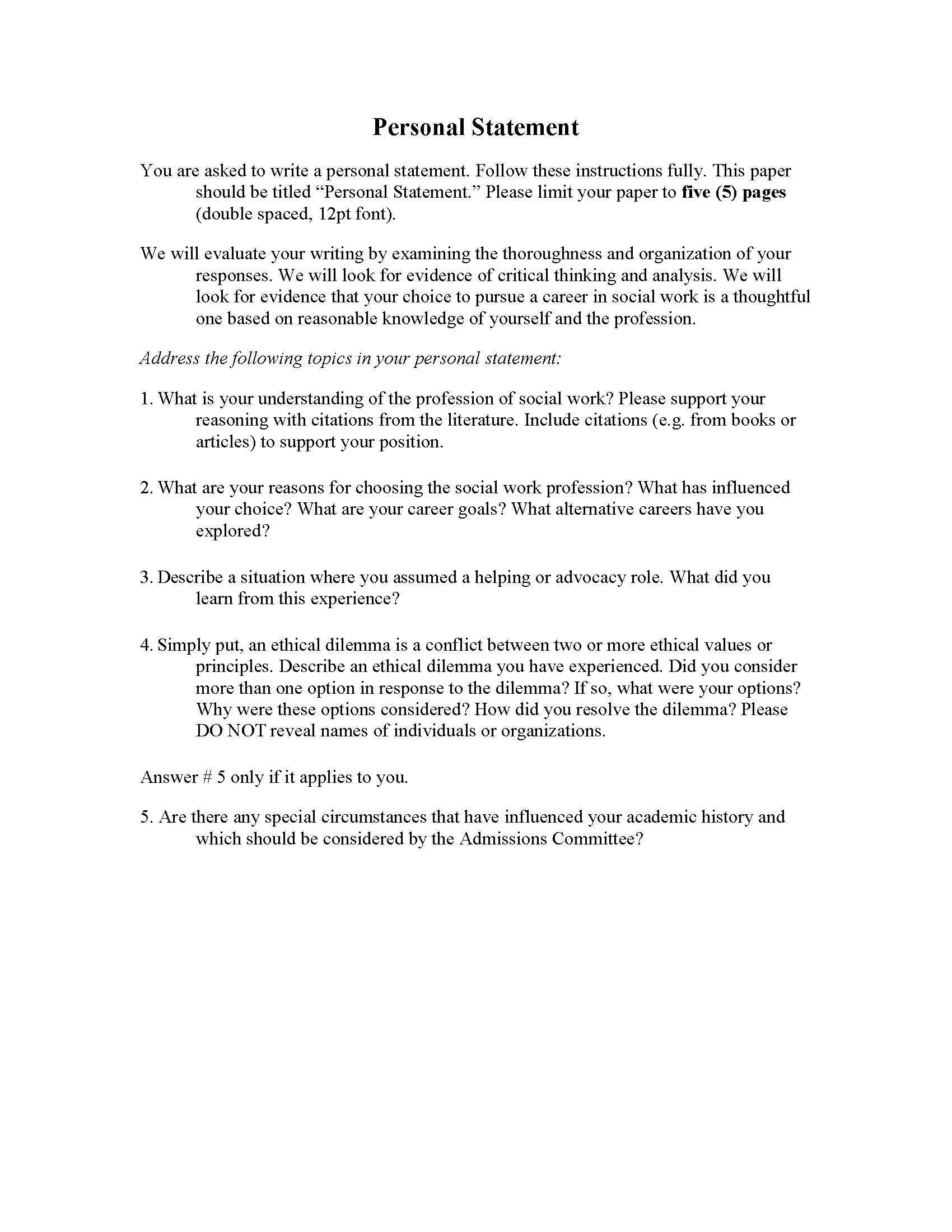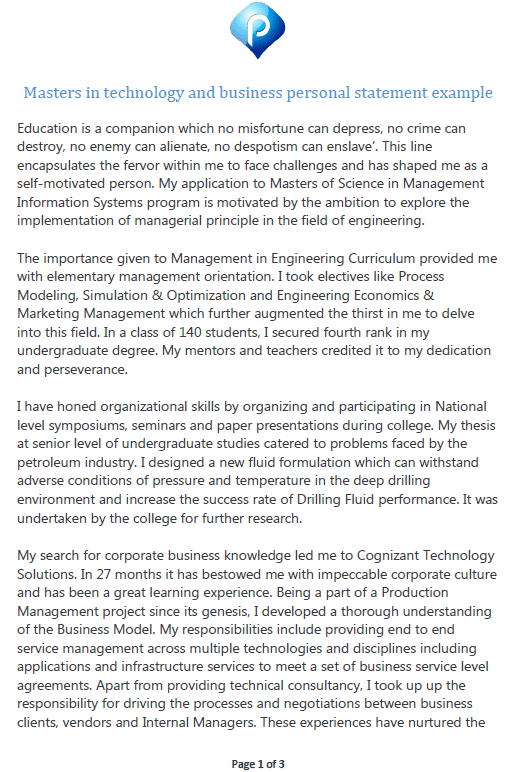
Example of a Personal Statement for a Masters Describe your reasons for wanting to study this particular course and what you believe you will gain from it Jun 17, · A good personal statement focuses on something special or distinctive about you and your career. You might include details of your life and career and discuss why you decided to pursue a Master of Legal Studies. Most importantly, be sure to include a vision for your future Your Personal Statement is a great opportunity for you to introduce yourself and outline why you're a compelling candidate for a course. You should demonstrate your enthusiasm for the course and highlight the skills you've gained from your academic studies and your work or life experience
How To Write A Personal Statement for Graduate School | Seattle U
One of the most vital parts of your application is your postgraduate personal statement, so you need to convince admissions tutors that you deserve a place on a course. Take a look at our personal statement examples for inspiration. A Masters personal statement is a piece of writing that you submit as part of your postgraduate application.
It's your first real chance to sell yourself to the university and to demonstrate to admissions tutors that you're right for the course. It's likely that you've already written a personal statement for your Bachelors degree, so this should give you some idea of what to expect, however don't be tempted to use your undergraduate personal statement as a template.
Personal statement for masters will have progressed academically since then and admissions tutors will want to see evidence of this. Your postgraduate personal statement should be unique and tailored to the course that you're applying to. Use the opportunity to show off your academic interests and abilities, and to demonstrate that the programme will benefit from your attendance as much as you'll benefit from studying it. A Masters personal statement should be personal statement for masters words.
This equates to one side of A4. However, some universities require more, often two sides. Some institutions also set a character limit instead of a specific word count, so check the application guidelines before starting to write your statement. Don't waste words on autobiographical information. This isn't necessary in postgraduate personal statements.
Instead, focus on why you want to study a particular programme and your potential to successfully complete the course. You should tailor your personal statement to fit the course you're applying for, so what to include will largely depend on the course requirements. However, in general you should personal statement for masters about:. Address any clear weaknesses, such as lower-than-expected module performance or gaps in your education history.
The university will want to know about these, so explain them with a positive spin. Lower-than-expected results may be caused by illness, for example. Admit this, but mention that you've done extra reading to catch up and want to improve in this area, personal statement for masters. Keep these explanations short and optimistic and instead focus on the positive outcomes. Your personal statement should follow a logical, methodical structure, personal statement for masters, where each paragraph follows on from the one before.
Make sure paragraphs are short, succinct, clear and to the point. Capture the reader's attention with an enthusiastic introduction covering why you want to study a particular Masters. Then, engage the reader in your middle paragraphs by evidencing your knowledge and skills and demonstrating why the course is right for you.
Your conclusion should be concise, and summarise why you're the ideal candidate. Overall, aim for five or six paragraphs. You can use headings to break up the text if you prefer, personal statement for masters.
The majority of postgraduate applications are submitted online directly to the university, personal statement for masters. If this is the case, personal statement for masters, present your personal statement in a standard font such as Arial, Calibri or Times New Roman, text size 11 or If your course application is submitted through UKPASS UCAS's postgraduate application service font style won't matter as personal statements will be automatically formatted. Try not personal statement for masters waste too much time coming up with a catchy opening.
The more you try, personal statement for masters, the more contrived you'll sound and the more personal statement for masters you are to fall into the trap of using clichés. Admissions tutors read hundreds of applications per course so the opening paragraph of your personal statement needs to get straight to the point and make a real impact.
Avoid overkill statements, gimmicks and popular quotes. Conclusions should be short, sharp and memorable, and leave no doubt in an admissions tutors mind that you deserve a place on a course. The perfect ending should pull all of your key points together without waffling or repeating yourself. Like the rest of your Masters personal statement, keep the ending simple.
Be succinct and make it clear why you'll be an asset to the university and end on a positive note, with a statement personal statement for masters why the institution would be lucky to have you as a student.
The style and content of your postgraduate personal statement depends on several variables, such as the type of qualification that you're applying for - such as a Masters degreethe Legal Practice Course LPC or teacher training. Here are four postgraduate personal statement templates to help you get started:. Although CAB the centralised applications system, allows space for up to 10, characters in length, many law schools aren't expecting students to fill this space.
It's therefore important not to unnecessarily pad out your personal statement with irrelevant detail. Students apply for three courses ranked in order of preference, so your personal statement must reflect this. Discover more about the Legal Practice Course. Applications for conversion courses such as these are fairly straightforward and made directly to individual institutions. You need to explain why you want to change subjects and how your current subject will help you.
Explain what experience you have that will help with your conversion subject, and what you hope to do in the future. Learn more about psychology conversion courses. This is your chance to explain why you want to teach primary age children and convey your enthusiasm for teaching. You need to back everything up with examples from your classroom experience, reflecting on what you did, how this made a difference and what you learned about teaching and learning within Key Stages 1 and 2.
Find out more about applying for teacher training. If you want to teach children aged 11 and over you'll need to apply through UCAS Teacher Training UTT, personal statement for masters. The UTT teacher training application process includes a single personal statement, whatever route s you're applying for. You should tailor your personal statement to reflect the specific requirements of secondary level teaching.
Learn more about applying for teacher training. Jobs and work experience Search graduate jobs Job profiles Work experience and internships Employer profiles What job would suit me? Job sectors Apprenticeships Working abroad Gap year Self-employment. Search postgraduate courses Funding postgraduate study Universities and departments Study abroad Conversion courses Law qualifications.
Masters degrees MBA courses PhD study Postgraduate diplomas and certificates Professional qualifications Teacher training. What can I do with my degree? Getting a job CVs and cover letters. Applying for jobs Interview tips Open days and events. Choosing a course Getting into university Student loans and finance. University personal statement for masters Changing or leaving your course Alternatives to university. Log in Register. Job sectors Apprenticeships Working abroad Gap year Self-employment Postgraduate study Search postgraduate courses Funding postgraduate study Universities and departments Study abroad Conversion courses Law qualifications Masters degrees MBA courses PhD study Postgraduate diplomas and certificates Professional qualifications Teacher training Careers advice What can I do with my degree?
Getting a job CVs and cover letters Applying for jobs Interview tips Open days and events Applying for university Choosing a course Getting into university Student loans and finance University life Changing or leaving your course Alternatives to university Post a job. Masters degrees. On this page What is a personal statement? How long should a postgraduate personal statement be? What should I include in a Masters personal statement?
How should I structure my personal statement? How can I write a good postgraduate personal statement? What do I need to avoid? How should I start my Masters personal statement? How should I end my personal statement? What are admissions tutors are looking for? Personal statement examples. View all Masters degrees. Take a look at our personal statement examples for inspiration What is a personal statement?
However, in general you should write about: Your reasons for applying for a particular programme and why you deserve a place above other candidates - discuss your academic interests, career goals and the university and department's reputation, and write about which aspects of the course you find most appealing, personal statement for masters, such as modules or work experience opportunities.
Show that you're ready for the demands of postgraduate life by demonstrating your passion, knowledge and experience. Your preparation - address how undergraduate study has prepared you for a postgraduate course, personal statement for masters, mentioning your independent work e. dissertation and topics that most interested you. Evidence of your skillset - highlight relevant skills and knowledge that will enable you to make an impact on the department, summarising your abilities in core areas including IT, numeracy, organisation, communication, time management and critical thinking.
You can also cover any grades, awards, work placements, extra readings or conferences that you've attended and how these have contributed to your readiness for Masters study. Your goals - explain your career aspirations and how the course will help you achieve them.
Give yourself plenty of time and don't rush. Your personal statement can make or break your application so it needs to be perfect. Tutors can tell if you're personal statement for masters, and showing yourself up as uninformed could be costly. Before you start, read the rules and guidelines provided, check the selection criteria and research the course and institution.
The best personal statements adopt a positive, enthusiastic and professional tone and are presented in clear, short sentences. Avoid elaborate or overly-complicated phrases. Unless otherwise stated, all personal statement for masters personal statements should be written in English and your spelling, grammar and punctuation must be perfect, as the personal statement acts as a test of your written communication ability, personal statement for masters.
Don't use the same supporting statement for every course. Admissions tutors can spot copy-and-paste jobs. Generic applications demonstrate that you have little understanding of the course.
Tips for Writing a Strong Personal Statement for Graduate School
, time: 7:59Writing the personal statement online – format, examples, sample

Your Personal Statement is a great opportunity for you to introduce yourself and outline why you're a compelling candidate for a course. You should demonstrate your enthusiasm for the course and highlight the skills you've gained from your academic studies and your work or life experience Personal statement for graduate school won't contain any information about your desperate need of financial assistance in studying. This is what a personal financial statement for. Planning to become a famous doctor and getting a medical certificate? Write a medical school personal statement, Your Masters personal statement should have a clear, logical structure, where the paragraphs flow coherently from one to the next. For the opening paragraph, you should try to grab the admission tutor's attention with an positive and passionate introduction that tells admission

No comments:
Post a Comment